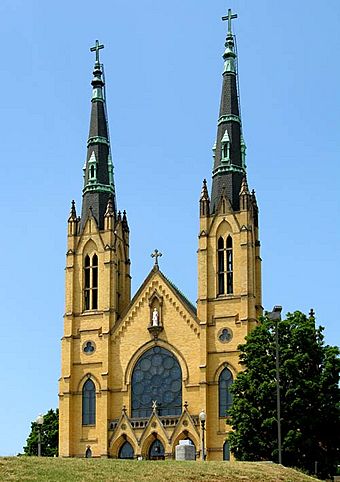Basilica of St. Andrew (Roanoke, Virginia) facts for kids
|
St. Andrew's Roman Catholic Church
|
|

Basilica of St. Andrew, June 2010
|
|
| Location | 631 N. Jefferson St. Roanoke, Virginia |
|---|---|
| Area | 1 acre (0.40 ha) |
| Built | 1883, 1887, 1900-1902 |
| Architect | William Ginther |
| Architectural style | Gothic Revival |
| NRHP reference No. | 73002225 |
Quick facts for kids Significant dates |
|
| Added to NRHP | May 7, 1973 |
The Basilica of St. Andrew, also known as St. Andrew's Catholic Church, is a beautiful and historic church located in Roanoke, Virginia. It's a special building that has been around for over 120 years! This church is known for its amazing Gothic Revival architecture style, which means it looks like the grand churches built in Europe many centuries ago. It also has a rectory, which is the house where the church's priest lives.
Contents
A Look at the Church's Design
The Basilica of St. Andrew was built between 1900 and 1902. It is made of light brown bricks and sits on a strong stone foundation. The church has a special shape called a "cruciform plan," which means it looks like a cross from above.
Tall Towers and Stained Glass
One of the most striking features of the church are its two tall Gothic towers. These towers stand on either side of the main entrance. Each tower has small, pointed windows called "lancet windows." They also feature large, pointed-arch windows filled with colorful stained glass. These windows often tell stories from the Bible or show important religious figures. At the very top of the towers, there are double pointed-arch openings where the church bells are located.
The Rectory and Earlier Church
Before this grand church was built, there was a smaller brick church on the same spot, built in 1883. The current rectory, where the priest lives, was built a bit earlier, in 1887.
Building a Landmark
Building the Basilica of St. Andrew was a big project! The church building itself cost about $60,000 to construct. Another $40,000 was set aside for the beautiful decorations and details inside. The church was designed by an architect named William P. Ginther from Akron, Ohio. His design created a building that quickly became a famous landmark in Roanoke.
National Recognition
Because of its historical importance and beautiful architecture, the Basilica of St. Andrew was added to the National Register of Historic Places in 1973. This list includes buildings, sites, and objects that are important to American history.
Changes Over Time: Renovations
Like many old buildings, St. Andrew's Church has been updated and improved several times over the years.
First Major Updates
The first big changes happened after the Second Vatican Council. This was a series of important meetings in the Catholic Church that led to some changes in how Mass was celebrated. To allow the priest to face the people during Mass, a new altar was placed in front of the original, very fancy main altar. The original main altar was kept just as it was.
More Recent Changes
Later, the first new altar was replaced with an even more beautiful one made of marble. This marble altar is still used today. At the same time, some other parts of the church's interior were changed. Two smaller altars on the sides were removed, along with a long rail that used to separate the altar area from the rest of the church. Some of the religious art was also changed. The lighting inside the church was updated to make it brighter.
Big Renovation (2010-2014)
From 2010 to 2014, St. Andrew's went through its most expensive renovation project. The large pipe organ, which was difficult to maintain, was replaced with a modern electric organ. However, the old pipes were kept as decoration. In 2014, the church's steeples, which are the tall, pointed tops of the towers, were taken down and repaired. They were the original steeples from when the church was first built!
Becoming a Basilica
On September 6, 2023, the church received a very special honor. The Dicastery for Divine Worship and the Discipline of the Sacraments, which is a part of the Vatican, gave the church the title of "minor basilica." This means it's a church with special historical or spiritual importance, and it's a great honor for the community.
Images for kids
 | William Lucy |
 | Charles Hayes |
 | Cleveland Robinson |







